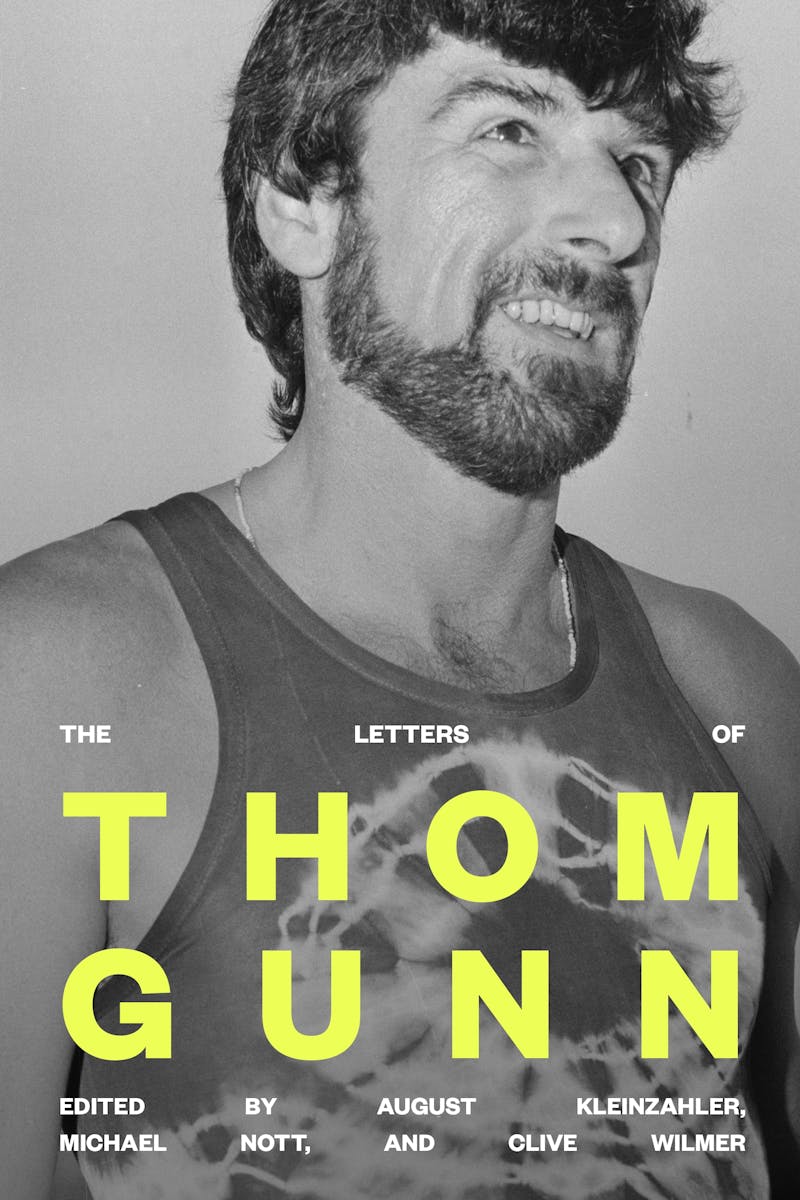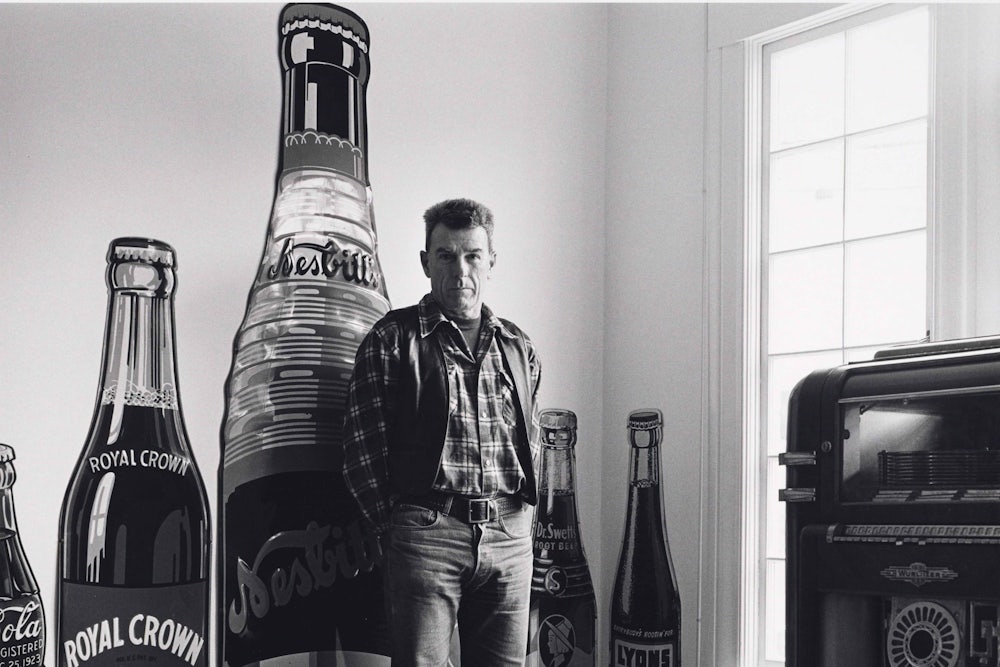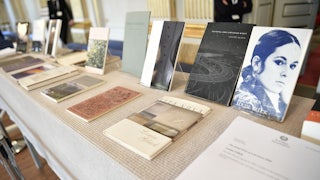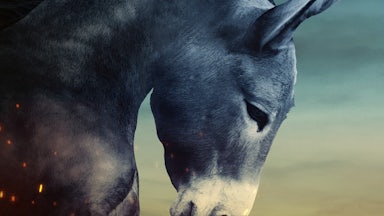In 1980, the poet Thom Gunn hung a poster of Sid Vicious in his workroom. Middle-aged when the Sex Pistols appeared in the 1970s, Gunn nonetheless felt a rapport with the young enfant terrible of punk rock. Both were disaffected Englishmen who jeered at the stuffy rituals and pomposity of their homeland. Both had fatal appetites for booze and drugs. Both fancied themselves exemplars of a live-fast-die-young credo that was self-fulfilling in Vicious’s case but jokily theoretical in Gunn’s. When the 74-year-old poet died of “acute polysubstance abuse” in 2004, there was a sense of delayed martyrdom, as if the tragedies he’d experienced—his mother’s early death, the catastrophe of AIDS—had taken an unusually long time to exact their cost.
Gunn has gone in and out of fashion over the years. His acclaimed debut, Fighting Terms, appeared when he was 24. Precocity gave way to an occasionally muddled mid-career, and then to the majesties of The Man With Night Sweats, his AIDS-era elegies, and Boss Cupid, his wry final book. Gunn was a student of Elizabethan stalwarts John Donne, Ben Jonson, and Fulke Greville, and he brought to his classical forms a sensibility refined through queerness, hallucinogenics, and hippie communalism. All three were abundant in Gunn’s San Francisco home, where he lived for more than 30 years with various housemates and a rotating menagerie of cats and dogs. As the poet Tom Sleigh has suggested, one source of Gunn’s deep originality is the connections he makes between “eroticism, pleasure, and domestic stability.” Consider, for example, these lines from Gunn’s “The Hug,” likely addressed to his longtime partner, Mike Kitay:
It was not sex, but I could feel
The whole strength of your body set,
Or braced, to mine,
And locking me to you
As if we were still twenty-two
When our grand passion had not yet
Become familial.

Critics weren’t always receptive to Gunn’s voice. A common refrain was that his verse is technically rigorous but chilly and impersonal. Others argued that moving to the United States in 1954 derailed his career. “On present showing, Gunn is living proof of that sad cliché that first thoughts are always the best,” the British writer Kenneth McLeish wrote in 1985, concluding that Gunn hadn’t fulfilled the promise of his early work. Even as he ventured into free verse in the 1960s and beyond, Gunn resisted the vogue for confessional, first-person theatrics that brought some of his peers renown. “Maybe it’s having read too many boys’ stories when I was little, or something, but I admire the understatement of feeling more than anything,” he wrote in 1963.
Understatement, subtlety, composure—these are the hallmarks of Gunn’s poetry, but so, too, are discreet intensity and controlled musicality. “I am at my best—in my writing, anyway—when I am trying to reconcile opposites,” he wrote in 1968. In The Letters of Thom Gunn, a new, behemoth collection of private correspondence across six decades, Gunn grapples with his states of in-betweenness: between being English and American; between writing free verse and formal verse; between exercising emotion and rationality. He’s often upbeat in these pages—it’s a little jarring to see him enthuse over There’s Something About Mary and Jurassic Park—but also prone to enervating self-doubt and depression. He’s candid about sex and aging, but largely silent about formative trauma. His self-image as a would-be Hells Angel cruising bathhouses runs aground on the reality of Gunn as a rather domestic man who cooks dinner for his housemates, fusses over his lap cat, and putters around the garden. And that reality, too, abruptly segues into another: that of the kinky sexagenarian who hosts all-night benders and speed-fueled threesomes.
The letters draw out the contradictions that made Gunn something of an anomaly: an agile poet who renovated tradition to accommodate the rude litter of modernity. They also suggest that, like most great artists, he constructed himself piecemeal over decades—a process of continuous revision marked by alternating currents of grandiosity and despair. “I am a moderately egotistical, moderately generous, moderately strong, moderately intelligent man, like everybody else,” he wrote in a 1963 letter. That he wasn’t like everybody else is what makes these letters worth reading.
Gunn was born in Gravesend, just east of London, in 1929. His father was a newspaper editor, and his mother a journalist. The couple had a tumultuous marriage marked by infidelity on both sides; they divorced when Gunn was 10. His mother, an outspoken leftist who scandalized the neighbors by displaying communist flags, nurtured Gunn’s literary inclinations. “From her I absorbed the idea of books as a part of life, not merely a commentary on it,” Gunn later remarked. In 1944, his mother committed suicide by inhaling fumes from a gas-poker. Gunn and his younger brother Ander discovered the body, a moment memorialized nearly a half-century later in Gunn’s poem “The Gas-poker”:
One image from the flow
Sticks in the stubborn mind:
A sort of backwards flute.
The poker that she held up
Breathed from the holes aligned
Into her mouth till, filled up
By its music, she was mute.
Still, his mother’s death is a curious void in the poems and letters, alluded to and circled around but rarely confronted head-on. Even “The Gas-poker,” Gunn’s most explicit dramatization of the event, is written in third person, as if narrative legerdemain is necessary to broach this most primal of wounds. Whatever Gunn’s reticence, his mother’s influence is obvious in his politics (in a 1956 letter, he identifies as a socialist, albeit a “vague and lazy” one) and in his literary tastes. The second letter in the volume, addressed to his aunt, sees the teenage Gunn working through Thackeray’s Vanity Fair and the essays of William Hazlitt.
The young Gunn was drawn to domineering mentors. The first of these was the professor and critic F.R. Leavis, with whom he studied as an undergraduate at Cambridge. Gunn was impressed by Leavis’s commitment to the seriousness of literature and by his vision of poetry as a direct intellectual engagement with the vicissitudes of one’s time. His moral edicts also proved adhesive. “Anyone who took Leavis’s lectures will remember the way he’d say ‘self-pit-teh’ when talking about, let’s say, some poem by Shelley,” Gunn told a later interviewer. The notion of self-pity as somehow disgraceful or pathetic recurs throughout Gunn’s letters. When his father died in 1962, Gunn derided him as a “ruthless and self-pitying man.” Gunn understood self-pity as a holdover of “Victorian public school values,” which his generation rejected, and which, he argued, his British contemporaries—notably Kingsley Amis and Philip Larkin—transformed into aesthetic brutality. (This aversion to self-pity also underlaid the Values, the existentialist code of conduct that Gunn’s friend and classmate Tony White summarized in a 1954 message as “panache, logique [logic], espagnolisme [love for Spain], l’imprevu [the unexpected], singularité [singularity] and MAGNANIMITY.”)
Gunn’s other, more instrumental mentor was Yvor Winters, whom he met when he moved to the United States to attend Stanford. Winters—“a sort of American Leavis,” in Gunn’s words—was a poet and professor who promoted a rational and anti-Romantic approach to literature. “I believe that the work of literature, in so far as it is valuable, approximates a real apprehension and communication of a particular kind of objective truth,” Winters wrote, establishing the model for Gunn’s work. In a 1969 letter to the poet Donald Hall, Gunn further clarifies his own aims: “My difference from most of the good people around is that I’m not primarily interested in capturing the thing-in-itself or the experience-in-itself and in producing it on its own terms, I am interested in why it seems important.” To get at that question, Gunn employs the so-called Plain Style of poetry, which, as its name implies, is a clean, lithe verse that seeks to communicate something essential about the world. Under Winters’s guidance, Gunn traced lineages between classical poetry and the work of Modernists such as Robert Duncan, William Carlos Williams, Ezra Pound, and Wallace Stevens.
An amusing subplot of the letters is how frequently—and in which direction—Gunn revises his estimation of other writers. In a 1973 letter shortly after W.H. Auden’s death, Gunn eulogizes his fellow expatriate as the “poet who most deeply influenced me.” A decade later, his tone hardens: “Now, I find I think of Auden very little.… He is quite simply not a very serious poet.” In 1954, he dismisses Marianne Moore as a “typical woman writer,” only to discover, in 1986, just how “splendid” her work is. In 1956, Philip Larkin is “a nice quiet poet, but of no particular importance after all,” while, two years later, he’s the only living British poet besides Ted Hughes that Gunn measures himself against. The verdicts wend like barbed wire through the letters: W.B. Yeats (“irritating” and “pompous”); T.S. Eliot (“boring” and “inhumane”); Charles Olson (“inflated reputation”); Walt Whitman (“always bad”); Sylvia Plath (“rambling” and “hysterical”); Adrienne Rich (“her poetry bores me”); John Ashbery (“you don’t even feel like wanting to know what he means”); Seamus Heaney (“I think he was invented by a committee of teachers with a sense of high fashion”).
Running parallel to this literary education is Gunn’s articulation of his sexuality and romantic potential. He knew early on that he was gay, although his acknowledgment of this fact became brasher as cultural trends changed. In a 1952 letter to Karl Miller, a fellow student at Cambridge (and the future founding editor of the London Review of Books), Gunn writes about a girl whom he could have easily seduced. “It did not seem worth the interest of the experiment if it were to be so joyless,” he notes, adding, “It is a pity to be perverted.” In December of that year, he met a young American, Mike Kitay, who was studying English at Cambridge. By the following May, Gunn was declaring his love in effusive notes, and that summer the pair embarked on a European tour. “If he was a girl it’d be so much easier! I’d marry him & it’d all be resolved,” Gunn wrote to his friend Tony White.
Perhaps in anticipation of Kitay returning to the United States in 1954 to complete his service in the Air Force, Gunn applied for—and received—a fellowship at Stanford, thus beginning the long second act of his life. Although he and Kitay had a turbulent relationship that became largely sexless after the 1960s, they remained together until Gunn’s death. “I’ll never be your ideal, but you’ll never find your ideal on earth,” Gunn wrote to Kitay in 1961.
The American years span most of Gunn’s adult life and crystallize his reinvention as a poet, abetted by his embrace of a distinctly Californian ethos. Gunn writes of the state, “It’s about as different from the rest of America (Europe-conscious New York, and the great ignorant spaces of the Middle West between, and the impenetrable South) as the rest of America is from Europe.” He came to associate England with an “unsatisfactory side” of himself; the country was the claustrophobic site of his youthful dissipation and the end of innocence when his mother died. His relationship with his father was gutted. (In 1962, after his father died, Gunn wrote to the editor Robert Conquest, “My father died recently, and I was rather shocked that I couldn’t feel anything at all.”) The United States offered a kind of rebirth. “I’d say that whereas there are several Englands … there are hundreds of Americas, and I haven’t got to the end of them yet,” Gunn wrote.
In 1957, Gunn accepted an offer to teach at Berkeley, a post he held, off and on, until he retired in 1999. The Bay Area was then a hotbed of avant-garde poetry, anchored by the Poetry Center at San Francisco State University, which hosted a public reading series, and the bohemian City Lights Bookstore. Jack Spicer, Robert Duncan, Bob Kaufman, John Wieners, and the Beats haunted North Beach. In November 1958, Gunn met Paul Bowles—a “minor” and “bad” novelist in his opinion—who gave Gunn his first mescaline pill, kicking off a lifelong romance with psychedelics. A 1971 letter to his friend Tony Tanner rhapsodizes about a weekend jaunt to the geysers in Northern California, where everyone—male and female, gay and straight—frolicked naked, got stoned, and enjoyed orgies among the rocks. Averring the risk of “hippie sentimentality” in such an idyll, Gunn nonetheless calls it a “Garden of Eden,” suggesting how he views sex, drugs, and communalism as an almost holy trinity. Some poems from this period, such as “At the Centre,” from Moly, are about LSD. Unlike, say, Allen Ginsberg, Gunn exercises a high degree of restraint and formal control in this and other drug-inflected poems:
What is this steady pouring that
Oh, wonder.
The blue line bleeds and on the gold one draws.
Currents of image widen, braid, and blend
—Pouring in cascade over me and under—
To one all-river. Fleet it does not pause,
The sinewy flux pours without start or end.
Gunn’s self-discovery was tempered by profound insecurity and bouts of inertia. At 23, he fears he is already washed up: “I get the feeling that I started writing a few years ago with something like the proper Poetic vigour, & that everything since then has been weaker and phonier, tho more polished—all my writing since artificial inducement, a recapitulation, by reference to past work.” A year later, he writes to Helena Mennie Shire, another early mentor at Cambridge, “The trouble is, hell, I don’t really know whether I want to be a poet.” Variations on this anxiety continue for the rest of his life. In a 1956 letter to Tony White, he confides his fear that every poem will be his last. In another letter, he bemoans the “shocking smell of paper” that overwhelms him whenever he tries to write something representing life. Every new collection is shadowed by prolonged fallow periods. He dreads writer’s block and self-parody. In 1966, he bluntly declares, “I honestly have no intentions of being a Great Poet.”
The AIDS crisis didn’t make Gunn a great poet, but it elicited some of his greatest poems. His first mention of the pandemic occurs in a May 1983 note to the Canadian scholar Douglas Chambers. “I keep thinking I shd make out with less people, but God keeps throwing such wonderful-looking men in my path,” Gunn writes. A month later, he tells Chambers that he has restricted his sexual partners to a few regulars, and quips that they prod “each other with broomsticks held in welding-gloves.” As the death toll climbs, Gunn’s darkly comic tone grows subdued. His friend Allan Noseworthy falls ill and rooms at Gunn’s Cole Street house for a few weeks: “He is not self-pitying or pushily stoical—I must say I would like to act like him if I find myself with the condition. (As, after all, I well may.)”
Gunn’s sick friends are recast as models of heroism—and also as tragic muses. In the span of about a month in 1987, he lost four friends to AIDS, including an ex-boyfriend. “Death has a way of concentrating the imagination,” he wrote to a former student that year. By then, he was drafting the poems that became The Man With Night Sweats, arguably his finest achievement, and the book in which his disciplined style embodies its most worthy themes. The visceral horror of the hospital vigil in “Lament” is rendered with rhythmic precision:
In hope still, courteous still, but tired and thin,
You tried to stay the man that you had been,
Treating each symptom as a mere mishap
Without import. But then the spinal tap.
It brought a hard headache, and when night came
I heard you wake up from the same bad dream
Every half-hour with the same short cry
Of mild outrage, before immediately
Slipping into the nightmare once again
Empty of content but the drip of pain.
Perhaps it was survivor’s guilt, but during the rolling trauma of AIDS, Gunn seemed determined to disavow his own mortality. “I go regularly to the gym, and my ambition is to look like Popeye (old face on young body),” he writes in 1984. That same year, he reports having a speed-addled threesome that lasts for 15 hours. References to his age increase: “Luckily he is a gerontophile so he spotted my double chin, my hundreds of grey hairs, my craggy face etc. & we had a riotous evening together at home,” he writes of one conquest. In 1994, he develops an epistolary courtship with Billy Lux, a younger man he met in New York. Their exchanges have a teasing coquettishness. “I wear a jockstrap or nothing,” Gunn tells Lux in one letter. Elsewhere, he asks Lux if he’s circumcised, what kind of underwear he likes, if he uses cockrings. In a 2000 letter, Gunn mentions meeting a young addict named John with whom he has sex and does “an absurd amount of drugs.” He adds, “All this speed at my age will probably kill me soon.” He was right. As the letters attest, walking the line between destruction and freedom is its own subtle art. Gunn did it well, and, until the end at least, with consummate control.
Nearly 20 years after his death, what endures of Gunn’s work is the plain, searching immediacy of his voice, which steadies the poems and is encountered afresh in the letters. Gunn reckons with his own contradictions—that is to say, his humanity—in lines often backlit by tragedy. Rather than succumb to dreaded self-pity or combust in self-aggrandizement, he opts for the more treacherous middle road of self-inquiry. There’s a meditative grandeur to some of his best poems, a gradual disclosure of the self that’s as much intellectual as moral. His formal courtliness and aloofness on the page are largely at odds with today’s young poets. So is his idolization of Elizabethan forebears (who among us still reads Fulke Greville?). Yet the style feels already somehow timeless. Gunn’s subject is nothing short of what it’s like to be alive—a condition that, as he writes of death, is a “difficult, tedious, painful enterprise.” But one deserving of music nonetheless.






